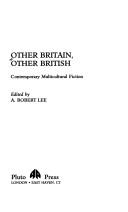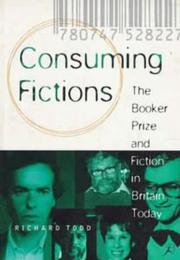| Listing 1 - 5 of 5 |
Sort by
|
Book
ISBN: 9781526107992 1526107996 9781526121097 1526121093 9780719081491 0719081491 1526108003 152613957X Year: 2016 Publisher: Manchester, UK : Manchester University Press,
Abstract | Keywords | Export | Availability | Bookmark
 Loading...
Loading...Choose an application
- Reference Manager
- EndNote
- RefWorks (Direct export to RefWorks)
This work offers readings of five of the most interesting and original voices to have emerged in Britain since the millennium as they tackle the challenges of portraying the new century. Through close readings of the work of Ali Smith, Andrew O'Hagan, Tom McCarthy, Sarah Hall and Jon McGregor, Daniel Lea opens a window onto the formal and thematic concerns that characterise a literary landscape troubled by both familiar and unfamiliar predicaments. These include questions about the meaning of humanness in an age of digital intercourse; about the need for a return to authenticity in the wake of postmodernism; and about the dislocation of self from the other under neoliberal individualism.
English fiction. --- 2000-2099 --- Ali Smith. --- Andrew O'Hagan. --- Authenticity. --- Connectivity. --- Contemporary British Fiction. --- Jon McGregor. --- Materiality. --- Sarah Hall. --- Tom McCarthy. --- Twenty-First Century Literature.
Book
ISBN: 1526112051 9781781705742 1781705747 9781526112057 0719078911 9780719078910 1526127172 Year: 2013 Publisher: Manchester New York Manchester University Press
Abstract | Keywords | Export | Availability | Bookmark
 Loading...
Loading...Choose an application
- Reference Manager
- EndNote
- RefWorks (Direct export to RefWorks)
"Starting with a sophisticated exploration of the historical development of the grotesque in literature, the book outlines the aesthetic trajectories of Angela Carter, Martin Amis, Ian McEwan, Iain Banks, Will Self and Toby Litt and offers detailed critical readings of key works of modern fiction including The Bloody Chamber (1979), Money (1984), The Child in Time (1987), The Wasp Factory (1984), Great Apes (1997) and Ghost Story (2004). The book shows how the grotesque continues to be a powerful force in contemporary writing and provides an illuminating picture of often controversial aspects of recent fiction."--Publisher's website.
English fiction --- Grotesque in literature. --- English literature --- History and criticism. --- Literature --- Literary Theory --- LITERARY CRITICISM / European / English, Irish, Scottish, Welsh --- Ireland --- Angela Carter. --- British fiction. --- British grotesque. --- British literature. --- European literary tradition. --- Iain Banks. --- Ian McEwan. --- Martin Amis. --- Toby Litt. --- Will Self. --- artistic mode. --- contemporary British writing. --- hallucinating characters. --- monstrous metamorphoses.

ISBN: 0745306462 0745306454 9780745306452 9780745306469 Year: 1995 Publisher: London : Pluto Press,
Abstract | Keywords | Export | Availability | Bookmark
 Loading...
Loading...Choose an application
- Reference Manager
- EndNote
- RefWorks (Direct export to RefWorks)
English fiction --- Literature and society --- Commonwealth fiction (English) --- Ethnic groups --- Cultural pluralism in literature --- Decolonization in literature --- Immigrants in literature --- Minorities in literature --- Minorities as a theme in literature --- Pluralism (Social sciences) in literature --- Ethnic identities --- Ethnic nations (Ethnic groups) --- Groups, Ethnic --- Kindred groups (Ethnic groups) --- Nationalities (Ethnic groups) --- Peoples (Ethnic groups) --- Ethnology --- Commonwealth of Nations fiction (English) --- Commonwealth literature (English) --- Minority authors&delete& --- History and criticism --- History --- Black authors&delete& --- Commonwealth of Nations authors --- English literature --- Minority authors --- Black authors --- POST-COLONIAL FICTION --- IRISH-BRITISH FICTION --- BRITISH LITERATURE --- BRITISH FICTION --- AUSTRALIAN FICTION --- DABYDEEN (DAVID) --- PHILLIPS (MIKE) --- MO (TIMOTHY) --- GURNAH (ABDULRAZAK) --- LITTERATURE JUIVE --- FRAME (JANET), 1924-2004 --- ISHIGURO (KAZUO), 1954 --- -KUREISHI (HANIF), 1954 --- -LAMMING (GEORGE), 1927 --- -RUSHDIE (SALMAN), 1947 --- -NAIPAUL (VIDIADHAR SURAJPRASAD), 1932 --- -SELVON (SAMUEL), 1923-1994 --- BRITAIN

ISBN: 0747528225 Year: 1996 Publisher: London : Bloomsbury,
Abstract | Keywords | Export | Availability | Bookmark
 Loading...
Loading...Choose an application
- Reference Manager
- EndNote
- RefWorks (Direct export to RefWorks)
English fiction --- Literary prizes --- Publishers and publishing --- History and criticism. --- History and criticism --- BRITISH FICTION --- BYATT (A.S.) --- CAREY (PETER), 1943 --- -GRAY (ALASDAIR) --- RICHLER (MORDECAI) --- ACKROYD (PETER) --- UNSWORTH (BARRY) --- BAILEY (PAUL) --- MO (TIMOTHY) --- HOLLINGHURST (ALAN) --- LITERARY PRIZES --- AMIS (MARTIN), 1949 --- -BARNES (JULIAN), 1946 --- -CARTER (ANGELA), 1940-1992 --- COETZEE (JOHN MAXWELL), 1940 --- -D'AGUIAR (FRED), 1960 --- -RUSHDIE (SALMAN), 1947 --- -PHILLIPS (CARYL), 1958 --- -SWIFT (GRAHAM), 1949 --- -WARNER (MARINA), 1946 --- -POSSESSION --- BOOKER PRIZE, THE
Book
ISBN: 1479854581 Year: 2019 Publisher: New York : Baltimore, Md. : New York University Press, Project MUSE,
Abstract | Keywords | Export | Availability | Bookmark
 Loading...
Loading...Choose an application
- Reference Manager
- EndNote
- RefWorks (Direct export to RefWorks)
'Old Futures' traverses the history of imagined futures from the 1890s to the 2010s, interweaving speculative visions of gender, race, and sexuality from literature, film, and digital media. Centering works by women, queers, and people of colour that are marginalized within most accounts of the genre, the text offers a new perspective on speculative fiction studies while reframing established theories of queer temporality by arguing that futures imagined in the past offer new ways to queer the present.
Gender identity in literature. --- Future, The, in literature. --- Speculative fiction --- History and criticism. --- Afrofuturism. --- American fiction. --- British fiction. --- LGBT. --- affect. --- black feminism. --- black queer studies. --- blackness. --- digital. --- dystopia. --- empire. --- eugenics. --- fandom. --- fantasy. --- fascism. --- feminism. --- film. --- futurity. --- gay. --- gender. --- lesbian. --- media. --- modernity. --- music. --- narrative. --- negativity. --- new media. --- pleasure. --- politics. --- punk. --- race. --- remix. --- reproduction. --- science fiction. --- sexuality. --- slash fiction. --- slavery. --- speculation. --- technology. --- television. --- temporality. --- transnational. --- utopia. --- vampire. --- vidding. --- video. --- violence. --- visual culture. --- whiteness. --- world-building. --- world-making.
| Listing 1 - 5 of 5 |
Sort by
|

 Search
Search Feedback
Feedback About UniCat
About UniCat  Help
Help News
News